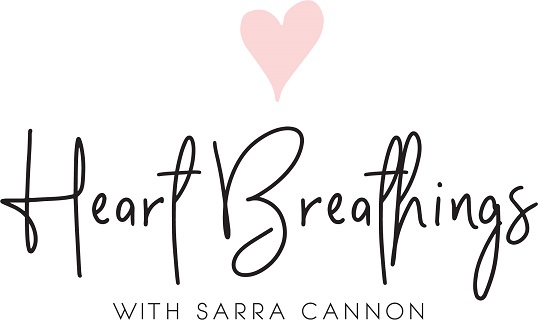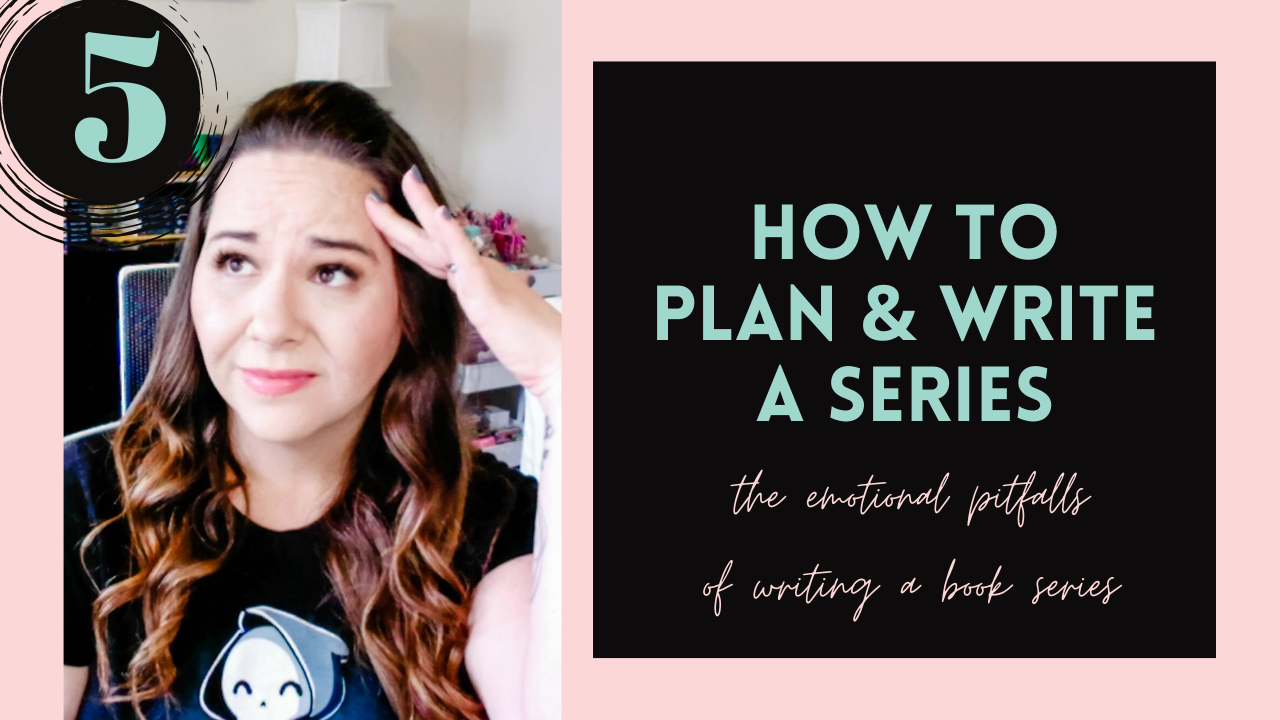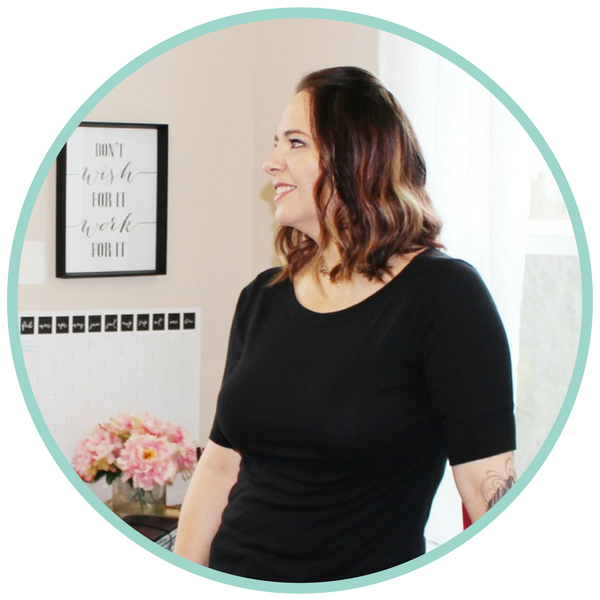

August 6, 2020 by Sarra Cannon
So far in this video and blog series, we’ve looked at various aspects of planning and writing a series, but one factor I feel is extremely important regarding your series plans is to think about the emotional toll a series can take on your mental health.
It’s honestly not something that’s often discussed. Instead, most authors will just talk about how writing a series is the best way to build fans and make money.
That’s totally true! (Particularly in Indie Publishing)
However, before you get started down this path, I want you to be aware of some of the emotional challenges you may face along the way. I also hope to give you some tools to use when things get tough.
Whew. This is an intense topic, and it’s difficult to cover it, even in a 45 minute video!
Writing a series over an extended period of time can be emotionally draining, and the process of building up a series can also trigger major self-doubt and imposter syndrome.
Then, add in the fact that you may always feel like you’re disappointing your fans or simply not good enough, and you’ve got some real challenges on your hands.
Below, I’ve written out what I’ve discussed in detail in today’s video. This isn’t a full list of all the emotional challenges you may face, but it’s my hope that you know going into this that mental health is incredibly important to your success.
In my opinion, you should continue to work on your mental health and confidence in the same way you are always working on your skills and knowledge.
Every writer faces self-doubt, whether you’re writing a series, non-fiction, or even just a blog post. We all feel it.
Writing a series can amplify these feelings of self-doubt and unworthiness.
Why? Because instead of creating one product and sending it into the world, then shifting your focus to something fresh and new, a series writer has to build with each book.
Your skill needs to build, you have to up the stakes, make it better, sell more books, meet the expectations of your fans…all while writing the next book in a series, which almost always becomes more complex the more books are involved.
Focus on your mental health. I can’t stress this enough. Pay attention to how you’re feeling and the things you’re saying to yourself inside your head.
When your self-doubt gets bad, it’s going to sound like this in your head sometimes:
“I’m not good enough.”
“This idea is crap. I never should have started this in the first place. It’s not a big enough/unique enough/good enough idea.”
“I’m not selling enough books to make it worth all this time I’m putting into it. Maybe I’m just not a talented author. I suck!”
These types of thoughts are toxic. Pay attention when you’re having them and find a way to counteract them with more positive thoughts.
Instead of spending your time focusing on these negative thoughts, try getting back to what excited you about your series and story world in the first place.
One of the best things you can for yourself is to turn those negative thoughts around, rather than letting them spiral or take you to a dark place. Writing book 2 or 3 of your series becomes impossible when things get dark inside your head. Trust me on this.
This is a subset of self-doubt, but it’s important enough to get its own section. Comparing yourself to other writers is a very dangerous habit to get into, but for some reason, when you’re writing a long series, it tends to become even more of a problem.
I think part of the reason for this is that instead of just having a single product to compare to someone else and realizing that you can just start fresh and maybe do better next time, you suddenly have several years worth of work that is taken as a whole. It’s a body of work that you’ve been building on for some time, so it feels like it has more weight and importance.
There’s more at stake for you, because you’ve invested so much into it.
When that self-doubt starts to creep in, it’s only natural for a lot of us to start looking to others to see how we measure up.
But here’s the thing, if you go looking for proof that you’re not good enough, you’re going to find it everywhere.
There will also be authors who have better sales, more reviews, raving fans, a faster turnaround. Even the guy who hit #2 on the New York Times Bestseller List this week could convince himself that he’s not good enough because he wasn’t #1.
Comparison fuels self-doubt, and it’s a dangerous pitfall to look out for, because when you’re asking your creativity to show up and be present for multiple books in a row, you can’t afford to lose time to comparisonitis.
Step away from the internet!
The best way I’ve found to deal with constantly comparing myself to others is to just step away from the places that trigger it most and to be hyper-aware of my own behaviors.
If you find yourself hanging out in social media groups that trigger feelings of unworthiness or comparison in you, stop going there! All the marketing advice in the world is not going to make up for the way comparison is going to derail you. I promise you this.
If you are always checking the sales ranks or reviews on other people’s books just so you can see how you measure up, stop doing it! It’s not helping you!
Instead, make a list of your most glowing reviews, reach out to your own fans for encouragement, make a list of your milestones, and keep writing.
For more on dealing with comparison, check out this video.
So, we all know about shiny object syndrome. We’ve likely all felt it or fallen for it in the past.
It’s a practical problem, but at its core, it’s also an emotional issue.
Writing a series can be emotionally draining, and eventually, it’s going to get hard.
At this point, a shiny new idea may come to you like a beacon in the darkness, promising a fresh start, lots of fun, and reminding you of that joy you once had when you started writing! It can seem like there is nothing more important in the world than following this new idea!
But beware of shiny new ideas. They will come at you right in the middle of your series when things are starting to pick up. Or they will come at you right at the mid-point of your next book when you just can’t figure out what’s supposed to happen next.
A lot of times, these ideas are coming to you because you’re burned out or scared. You are so tired of living in the same story world and working through these same problems over and over again. You want something new and exciting!!
And to be honest, sometimes that’s exactly what you need to kick-start your creativity. More on this later…
Often, however, shiny object syndrome is just a procrastination technique. It’s a way of avoiding the thing you most need to be working on to reach your dreams.
So, what do you do? Do you try out the shiny new genre? Follow the new passion? Or do you keep slogging through the old series?
This is going to be a very personal decision, and you’re the only one who can really know what you need.
However, before you go thinking that shiny new idea has all the answers, I want you to think about why you feel like you need a break.
Maybe you just need a few days off at the beach, instead of taking a year off your series to write a new one. Because you know what? Eventually that shiny new idea becomes a slog, too.
No idea stays shiny and new forever.
Part of the emotional challenge of writing a series is figuring out how to keep having fun with the ideas you’ve committed to. It’s just part of the job, so to speak.
When you start to feel the siren song of a new idea, take a step back, evaluate why you’re feeling that way, and then make the best decision for you and your career long term.
One tip, though, before you commit to starting a whole new series of books, is to really sit down and figure out what this new idea looks like in six months. Or a year. How does it fit into your career and your strategy? Is this actually going to help you be more creative? Or will writing it only put more pressure on your plate and stretch you even thinner in the long run?
If it’s too hard to fit in, consider writing something short that is shiny! A new short story, some flash fiction, poetry, or a novella. Then, reconnect with your original series and get back to work!

If you’re writing a long series, especially, this pitfall might come up many times throughout the journey.
Maybe you’ve written yourself into a corner. Maybe the story is just getting so freaking big that it’s hard to manage it all. Maybe you’re feeling overwhelmed by how much there is to this story world.
And at that point, you might start saying to yourself, “I just can’t do this anymore. I’m not a good enough writer to pull this off. It’s too hard.”
And the truth is, it might actually be hard.
With a series, you have to keep upping the stakes, making it better, pushing yourself to the limit of your own skill and experience. Each book builds on the last in some way, and the pressure and expectation to get better just adds up.
Writing is like a game, and writing a series asks to level up as a writer with every book you write.
It’s exhausting to keep pushing against your limit. To keep asking more of yourself and your skill. It’s not easy.
But this is what you signed up for, and you can do this. Just take it one step at a time.
Often, this feeling of “I can’t do this anymore” comes from a feeling of self-doubt, so all the coping mechanisms I talked about above can be helpful.
Sometimes, it also just comes from a knowledge that you are being asked to increase your skill to take this story to the next level. That can be really tough, but you can do this!
Every writer needs to grow, and a series is one of the best ways to keep improving. So, when you start feeling this way, don’t give up. Instead, lean in.
Study more craft stories, go back to your original inspiration and watch movies, read books, pull apart your favorite stories and figure out what makes them tick. Get inspired and then get to work.
One of the best things you can do is just get into action. Don’t let these feelings lead you into a dark place of procrastination and true debilitating self-doubt. Come up with a game plan of how you’re going to improve, learn, and move forward in your story, and then start working on it.
You might not have all the answers yet, but as long as you’re working toward them, the answers will come.
Sometimes, after working on the same story and the same characters or magic system straight for a decade (or however long you’ve put into it) can just get old. All those issues I listed before compound and can lead to true burnout with your series.
At this point, you won’t be putting your heart into this series, anymore. Every day you sit down to write, it’s just going to feel like a chore, and that spark of joy that got you started is nowhere to be found.
This is a different feeling from Pitfall #3 of Shiny Object Syndrome, but it’s tough to explain it if you haven’t been through both.
With shiny object syndrome, for me, it’s often just a feeling of, “Hey, this is getting tough, and there are all these other fun ideas calling to me!”
With burnout, though, it’s more like, “I just need a freaking break. I don’t want to write anything.”
It might manifest differently for you, but at some point, your series writing might reach a crisis like this, and you may ask yourself whether it’s even worth it to keep writing.
There are a couple of different ways this might be challenging for you.
These are two very different financial realities, but the way it feels deep down is still really dark and terrible.
When you start to feel this way, I think the best thing to do is to really analyze where this feeling is coming from.
Are you just emotionally drained and burned out and you simply need a break before the spark will return? Or is it truly the series’ fault that you’re feeling this way, and it’s time to move on?
One way to find out if the answer isn’t clear is to just take a vacation. Take a total break and do things that refill your creative well. Go to your favorite spot, do something just for fun, hang out with friends, travel, or read a bunch of books you love.
For more ideas, check out this video on how to avoid and deal with burnout.
Once you’re refreshed and your creative ideas are starting to flow again, how does it feel when you think about your series? Does it pull you right back to that dark place? Or are you excited about it again?
At this point, you’ll have your answer.
It sucks to totally abandon a series mid-story, so I recommend you try everything you can to avoid that (particularly if you’re writing a dynamic series that will feel incomplete), but in the end, your mental health is more important than anything else.
If you’re just done with a series, you can either let it go entirely, wrap it up in a way that at least gives a satisfying ending for fans, or you can take an open-ended vacation from that story and tell fans that you’ll get back to it when you can in the future.
It’s a tough place to be, especially if this series you no longer are putting your heart into is also the source of your main income. But in the end, continuing to write something that is sucking the soul from your body isn’t going to make anyone happy, least of all your fans.
Take care of yourself and do what you need to do. It’s going to be okay.
One of the reason series are such a great way to build your career as an author is that fans get incredibly invested in them. A series means your fans get to live in that world or with those characters for long periods of time.
This is awesome and powerful, and it’s one of the things I love most as a reader and an author.
However, fan involvement and investment in your series can become an incredibly source of stress.
A good problem to have, because wow, we have fans! That’s something to always be grateful for, of course. But there are emotional pitfalls here to be aware of.
Fans at some point won’t like the choices you make or the direction you chose to go in with a certain character. They’ll leave bad reviews, send you DMs and emails, letting you know it, too. (and likely providing suggestions on how you should have done it, instead.)
Fans may also give you a hard time about your writing speed. (Fact: No author can ever write fast enough for fans, because the moment you put a book out, someone will be asking where the next one is.) If I had a dollar for every angry email or message about how slow I am writing (despite publishing 26 novels in less than 10 years), I would have a lot more money than I have right now, ha.
Another issue you may run into if your series is popular is that fans might get upset when you’re writing anything that ISN’T part of that series. This can be an issue when you’re ending a series or even just taking a break.
This type of anger from fans can make us authors feel so much anxiety, I can’t even put it into proper words. It’s really difficult to keep your head up when these types of messages or reviews come up, because as an author, you feel like you’re disappointing the people you want and need most to please.
Take a deep break. You can’t please everyone. There is always going to be someone who thinks you made the wrong choice, didn’t write fast enough, should be writing more of this or less of that.
While our job as authors is to write books people will read and love, we can’t let angry messages from a handful of fans tear us down.
The best ways I have found to deal with this are to be open in my communication with fans and to limit direct access to me when I’m feeling vulnerable. Often, this means you’re open in the information you’re sending out but closed off in the way you receive information. Nothing gets through without a filter.
This is especially important when you’re feeling vulnerable or when you’re working through some of the other pitfalls listed above. It’s okay (and in fact, imperative), that you protect yourself and your mental health throughout this process.
What this looks like for me is posting blogs or live videos, newsletters, and other social media posts where I let fans know that I’m struggling because of a personal matter or that I’m working on the story but its taking longer than expected. A lot of times, fans just want an update, and they never meant to make you feel bad about how long it’s taking.
Most people will be kind and supportive.
However, in case some people aren’t so kind, you should consider setting up some kind of filtering system for messages that come to you. My husband recently took over my emails, for example. He sees them all before I do, and he deletes anything that’s especially harsh.
When I’m feeling vulnerable, I also turn on auto-responders or simply turn off notifications. My messages from fans are important to me, but a nasty message can derail my entire week, so I just don’t accept messages in places where I often get bad ones. (Facebook page being one of the worst, Email next.)
It’s okay to build a barrier around yourself. As much as you are grateful for your fans and want to please them and foster community, you don’t owe them 24/7 access to you, and you certainly don’t have to answer to your artistic decisions or the breaks you need to take for your own mental health.
Another thing that helps and is at the core of my values as a writer, is to turn my focus back to the joy of writing. When you start to feel down about fan messages or you feel you’re disappointing people, just turn off the noise and get back to your joy.
Take an email and social media break and reconnect with your story. Rediscover that spark of joy and get your fulfillment from there. Then, when you’re feeling stronger and more sure of yourself, come out from your joy-cave and say hello to the fans who love you!
I hope you enjoyed this video and post about the emotional dangers of writing a series. I sincerely hope some of these tips will help you in the future!
If you’ve just discovered this series of videos and posts, I’d love for you to head back to the first post on “Different Types of Series” and check out all of the information in this series.
This weekend, I’ll be adding a new video detailing some of the worst mistakes I’ve made over the past 10 years while writing my various series. Some of these are writing mistakes, and others are publishing and marketing mistakes.
I am hopeful that hearing about my mistakes will help you to avoid making the same ones along the way.
If you’ve been enjoying this series and are planning to self-publish your own series someday soon, I’d love for you to join my self-publishing course.
This is a fundamentals course that is great for authors who are not yet self-published, traditionally published authors looking to self-publish, and for authors who have several books published but are looking to take it to the next level.
But it’s not just about the how-to side of writing and publishing your books or setting up your business. It’s also a course that addresses how to cultivate a success mindset so that you can truly create a career that will bring you joy and fulfillment.
You can read more about Publish and Thrive on the course website here.

We start Monday, August 10th, so I’d love for you to join us!


I have been self-publishing my books since 2010, and in that time, I've sold well over half a million copies of my books. I'm not a superstar or a huge bestseller, but I have built an amazing career that brings me great joy. Here at Heart Breathings, I hope to help you find that same level of success. Let's do this.
Hi Sarra, looking forward to Publish and Thrive. Anyhow, I think my biggest issue with my series is that I’d planned on a trilogy and it’s getting longer. Since it’s a romance my biggest worry is the pacing and that it’s boring…otherwize, this is the most fun I’ve had in writing for years. If nothing else, if it doesn’t sell well, it’s okay, it’s given me back my love of writing, and to me, since I was burnt out on historical romance, that means everything. See you next week. I can’t wait.